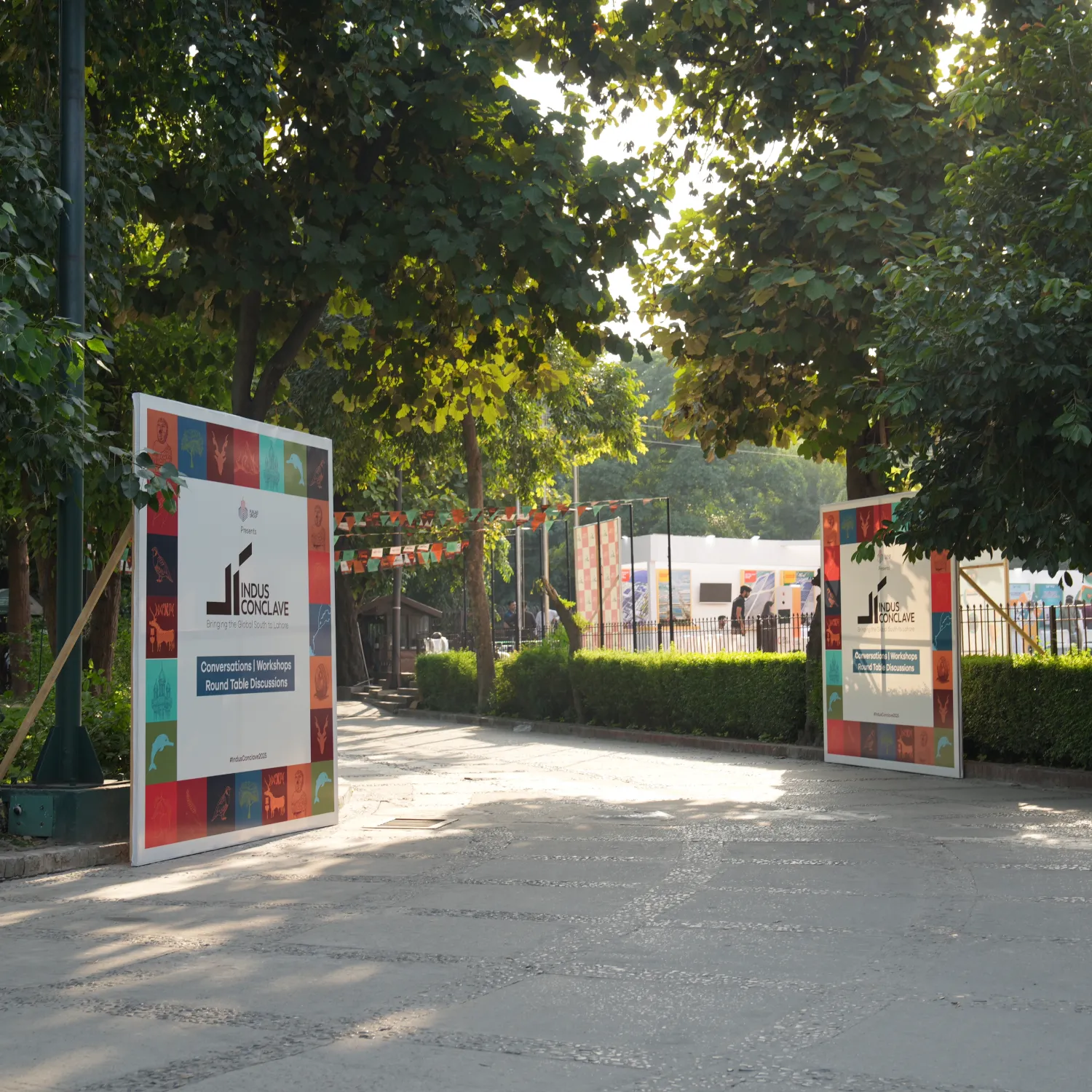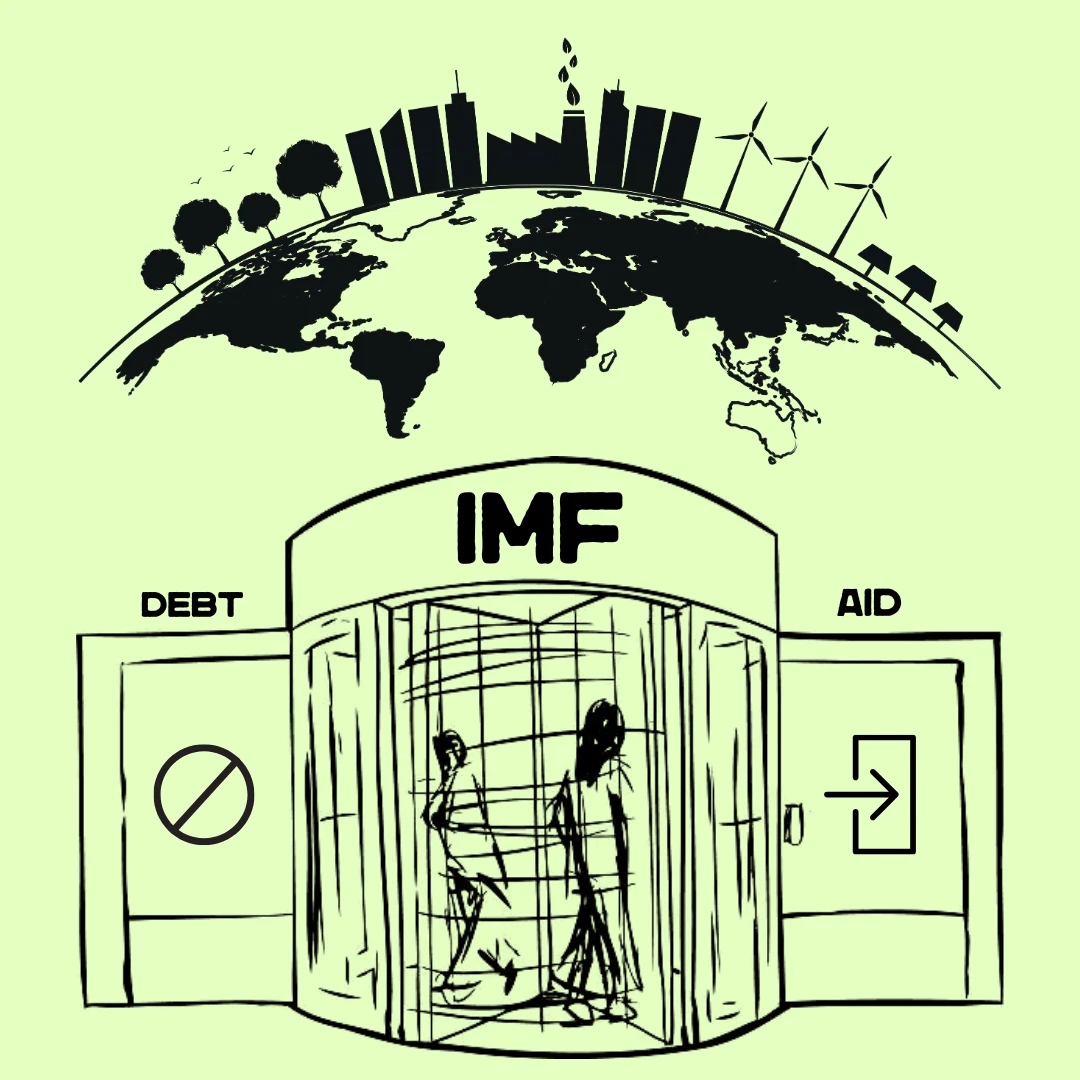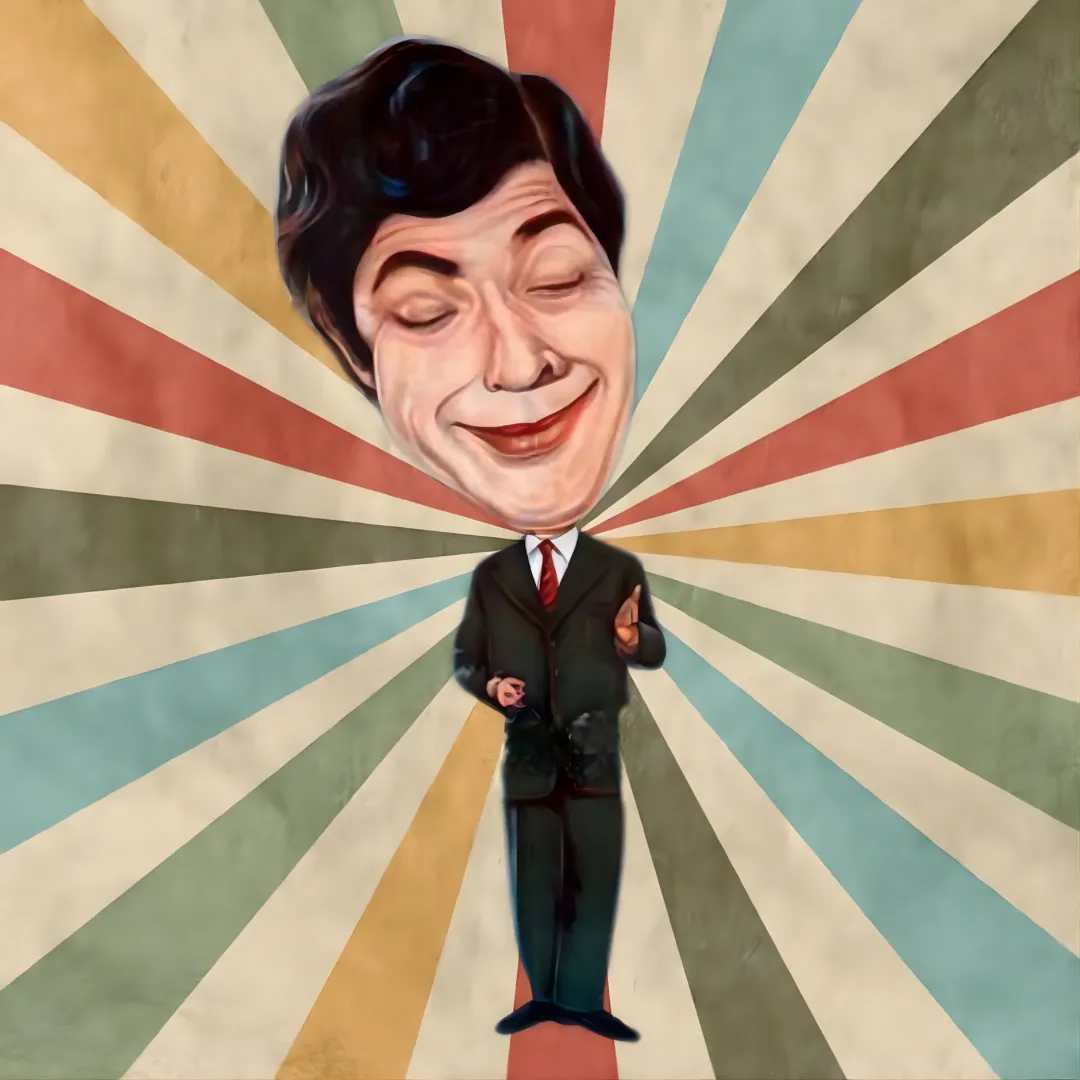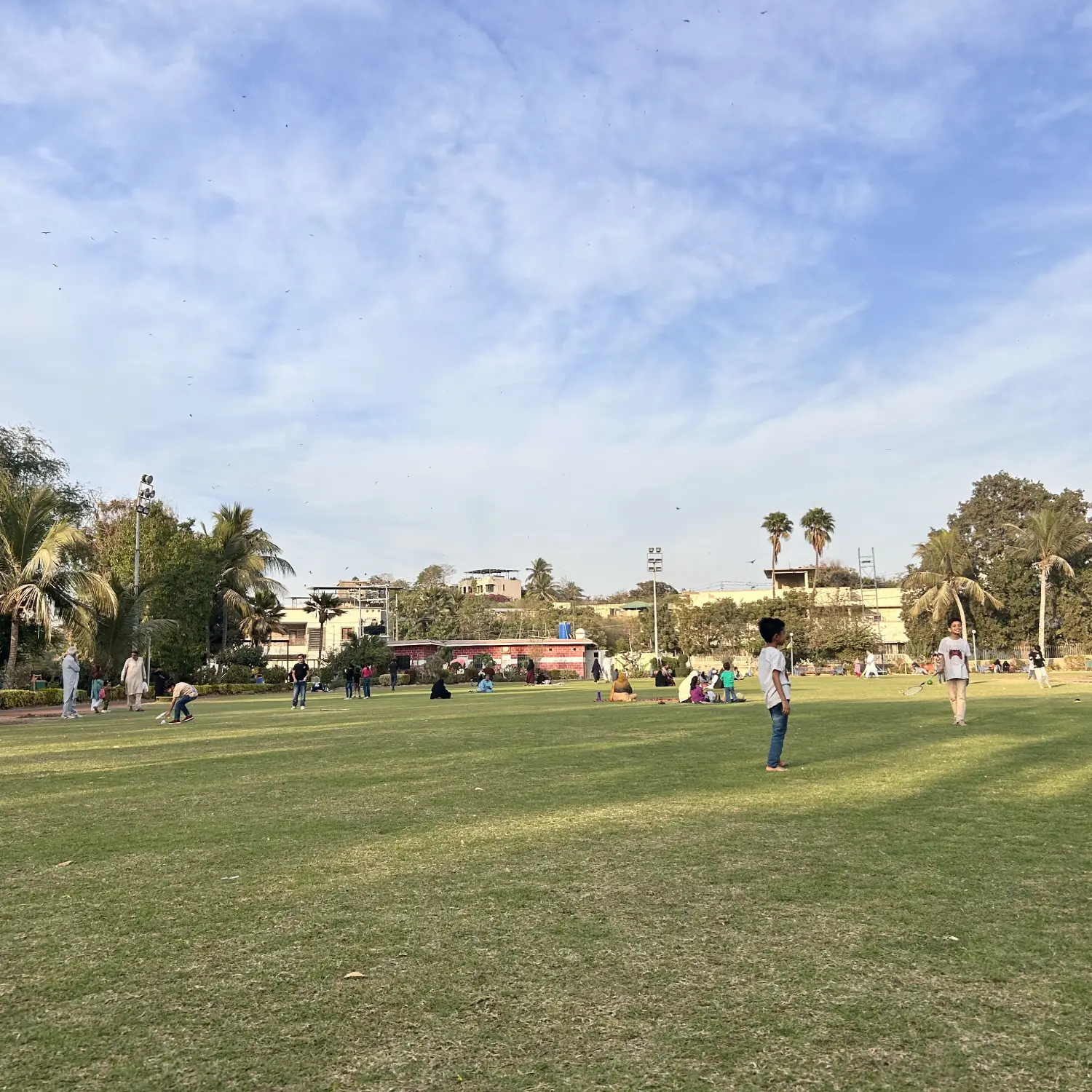On a bright October morning during the first weekend of the month, the Indus Conclave 2025 took place in the hallowed halls of the Alhamra Arts Center on Mall Road, Lahore. The venue is a revered and time honoured institution when it comes to all things culture, literature and art, and provided the perfect backdrop for thought leaders from around the world to gather in its halls, auditoriums, gardens and courtyards to discuss pressing issues plaguing the world today, and to reflect upon important lessons from history.
According to the vision statement of the Conclave, founded by Khadija Amer & Raza Goraya:
“The idea of the Indus Conclave is to build South-South solidarities; for it to be a place that recentres the narratives, histories and geographies of the global majority. We wanted to imagine a world beyond the Western hemispheric lens.”
Literary festivals are not a new phenomenon by any means, and have long served as important hallmarks in the cultural calendar, providing a platform for thinkers and writers to share their experiences and research with attendees, creating opportunities for meaningful dialogue on important issues. The tradition of intellectual conferences and festivals is an ancient one, starting with the Panathenaia recorded in Greece (566 BCE onwards) and Compitalia in Rome, down to the Frankfurt Book Fair that dates back to the 12th century. The Frankfurt Book Fair in particular expanded the horizons of what were then known as cultural or literary festivals, with merchants and academics travelling to these fairs not only to gain firsthand access to new ideas and manuscripts, but to engage in intellectual discussions with the community fostered by these events.
The idea of the Indus Conclave is to build South-South solidarities; for it to be a place that recentres the narratives, histories and geographies of the global majority. We wanted to imagine a world beyond the Western hemispheric lens.
The need for ‘thought festivals’ such as Indus Conclave feels extra pressing and urgent given the horrifying erosion of basic civil liberties and fundamental human rights around the world, not to mention the crumbling of democracy and world order. With the endless barrage of bad news on TV and social media it’s hard not to feel isolated and helpless in today’s world, but festivals like the Indus Conclave create such rewarding opportunities for social connection and cultural exchange, in addition to providing a platform for knowledge sharing by experts in the field, that the world feels a little less like a dark and dreary place.
During the Indus Conclave, panels such as Covering Conflict provided a valuable opportunity for audiences to listen to journalists Yassmin Abdel-Magied and Alex Shams share their first hand experiences covering ongoing genocides in Gaza and Sudan; while Documenting Natural Disasters had filmmaker Nyal Mueenuddin, amongst others, retell raw accounts of flood affected areas in Pakistan.
This kind of valuable insight is not easily accessible for the average person, aside from news reports and social media videos, which may be information rich, but lack a certain human element that accompanies a real life interaction.
In this vein, Life in the West Bank featuring Elias Deis was an eye opening account of the lived realities in an apartheid state, detailing the many ways in which the ‘state’ has fragmented and curtailed the very fabric of Palestinian society through Israeli military occupation. Elias referred to a life of “fear, anger and stress” that is unfortunately synonymous with the Palestinian identity under occupation, pointing out details such as a lack of access to clean water 24/7. He also exhibited his green ID that is given to Palestinians by the occupying force to segregate them from Israelis.
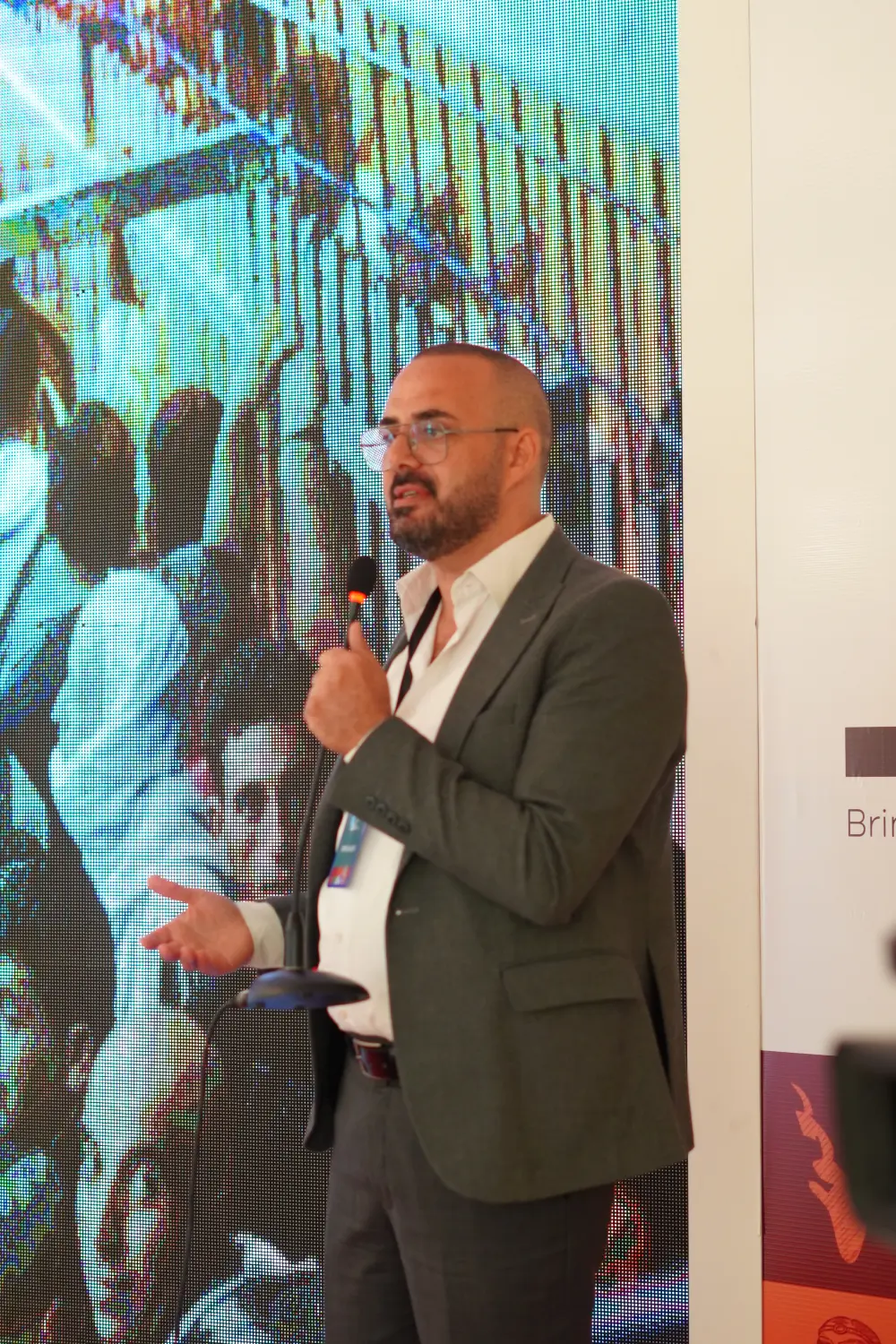
Kaya Genç, a Turkish investigative and literary journalist, and a panellist on Rethinking Global Governance: The UN at 80, spoke to me between sessions about his love for the literary community and how conferences such as the Indus Conclave bring people together, providing opportunities for cultural interaction, growth and learning about politics and history. “It’s curiosity in action,” he said to me with a smile, and the statement really resonated as we sat down to listen to an illuminating panel on The Impossibility of Palestine with Professor Mehran Kamrava and Asad Rahim Khan. Hall 1 hosted this particular panel and was absolutely packed with an audience that was rapt with attention. While the conversation was by no means an easy or lighthearted one, it was heartening to hear Professor Kamrava note that, “As a nationalist ideology starting from the 1800s, Zionism has gone through profound transformations and there is no reason to believe it won’t continue to transform profoundly, particularly given the fact that there is now an awareness in the world with regards to the genocide in Palestine, which did not exist previously. The needle is moving.”
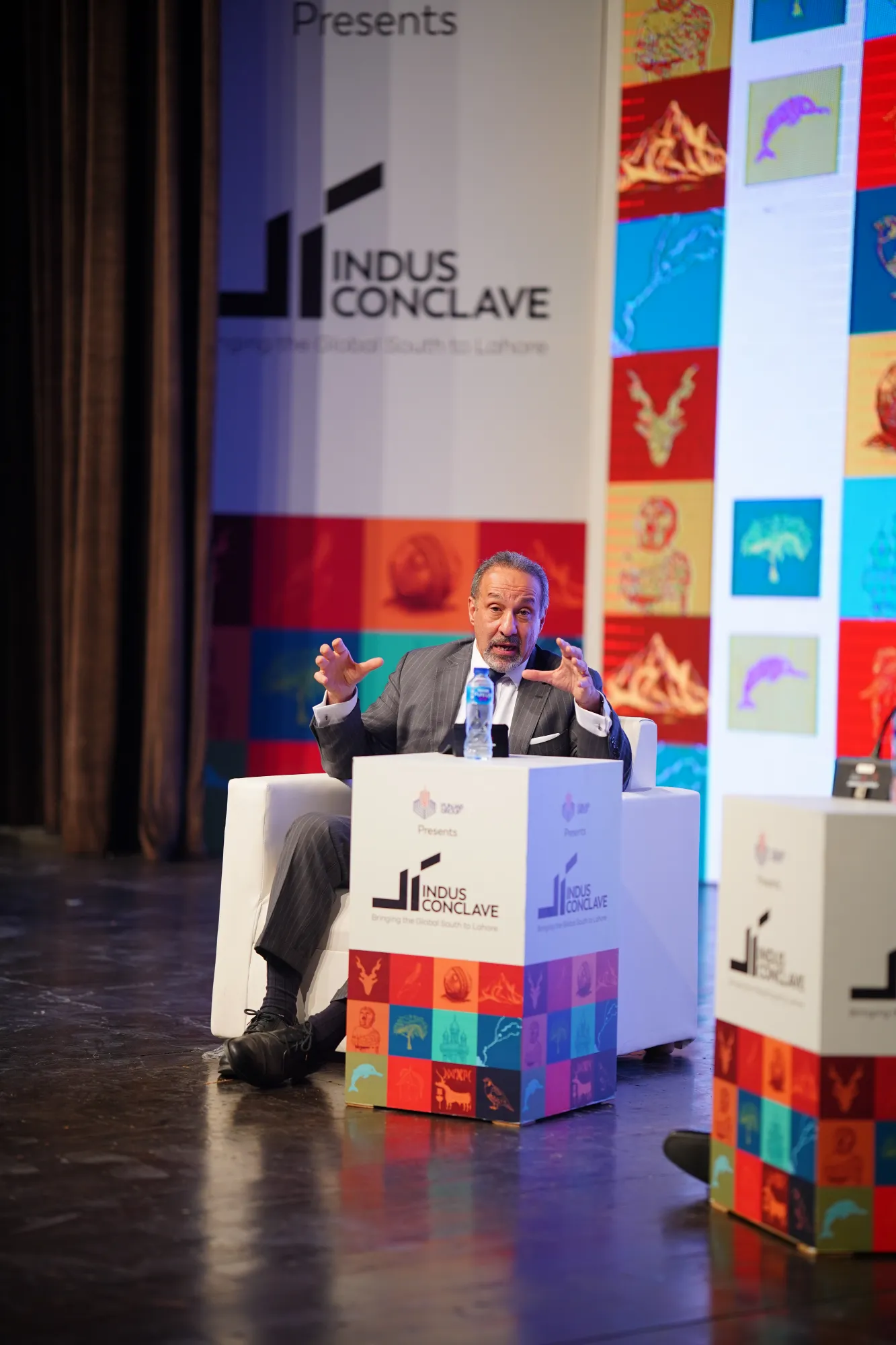
Identity and belonging were recurring themes at the Conclave, even in non-politically oriented panels. The conversation in Crazy Young Asians, featuring authors Dur e Aziz Amna and Aube Rey Lescure, for example, undoubtedly resonated with some audience members, as they spoke about the conflict between belonging to a place where one language is spoken, but finding oneself more comfortable writing in another language. This sense of fractured identity is one that many young Pakistanis can relate to—the struggle to remain connected to our mother tongue, whilst the language of the ‘educated’ is firmly entrenched in colonial ideals.
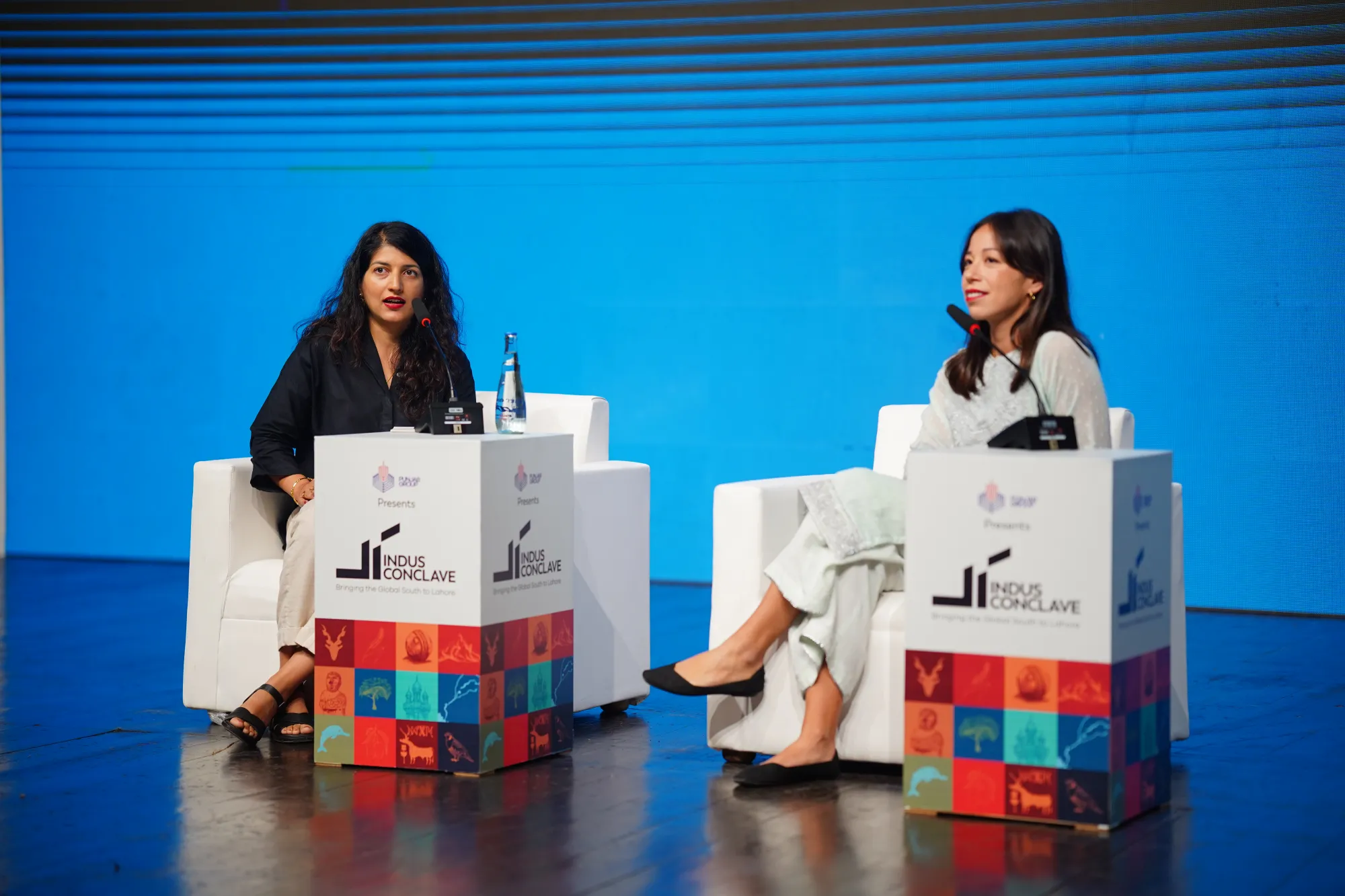
Another wonderful example of this sense of identity and languages at the conference played out during Mohammed Hanif’s micro-workshop Writing In Tongues. Here, a group of 13 writers sat together in a tight circle with the acclaimed writer, taking turns reading and collectively workshopping their Urdu, Punjabi and English short stories. The conversation was trilingual and frank, with Hanif peppering in pearls of wisdom such as: “We fall in love with our words as writers, but if you cut any writing by 20% it will be better.” One of the audience members Dr. Ain-ul-Momina, HOD of Community Medicine at King Edwards University, noted that as a ‘Punjabi revivalist’ she enjoyed any opportunity to appreciate and celebrate the language, and found Mohammad Hanif to be one of the few celebrated writers of our region who championed the often overlooked language.
Literary and academic festivals in Lahore feel truly unique in their inclusive nature: with an open door, no ticket required policy and a variety of programming, all kinds of patrons flock to such events. Young students, elderly people, men, women, families with young children, those inclined to dress ‘modern’ and Western, and also those resplendent in their ghararas and shalwar kurtas, all sorts of people could be observed on the grounds and in the halls of the venue. Some seemed to be there just for the joy of an afternoon out, meeting friends and wandering the grounds; others had come to specifically attend a panel or two, and then there were some like myself who had prepared for two packed days rushing from one auditorium to the next, trying to soak in as much knowledge as I could manage over the weekend. Public spaces are few and far between in the city of Lahore, and festivals such as the Indus Conclave provide a rare opportunity for equal participation from people of all socio-economic backgrounds.
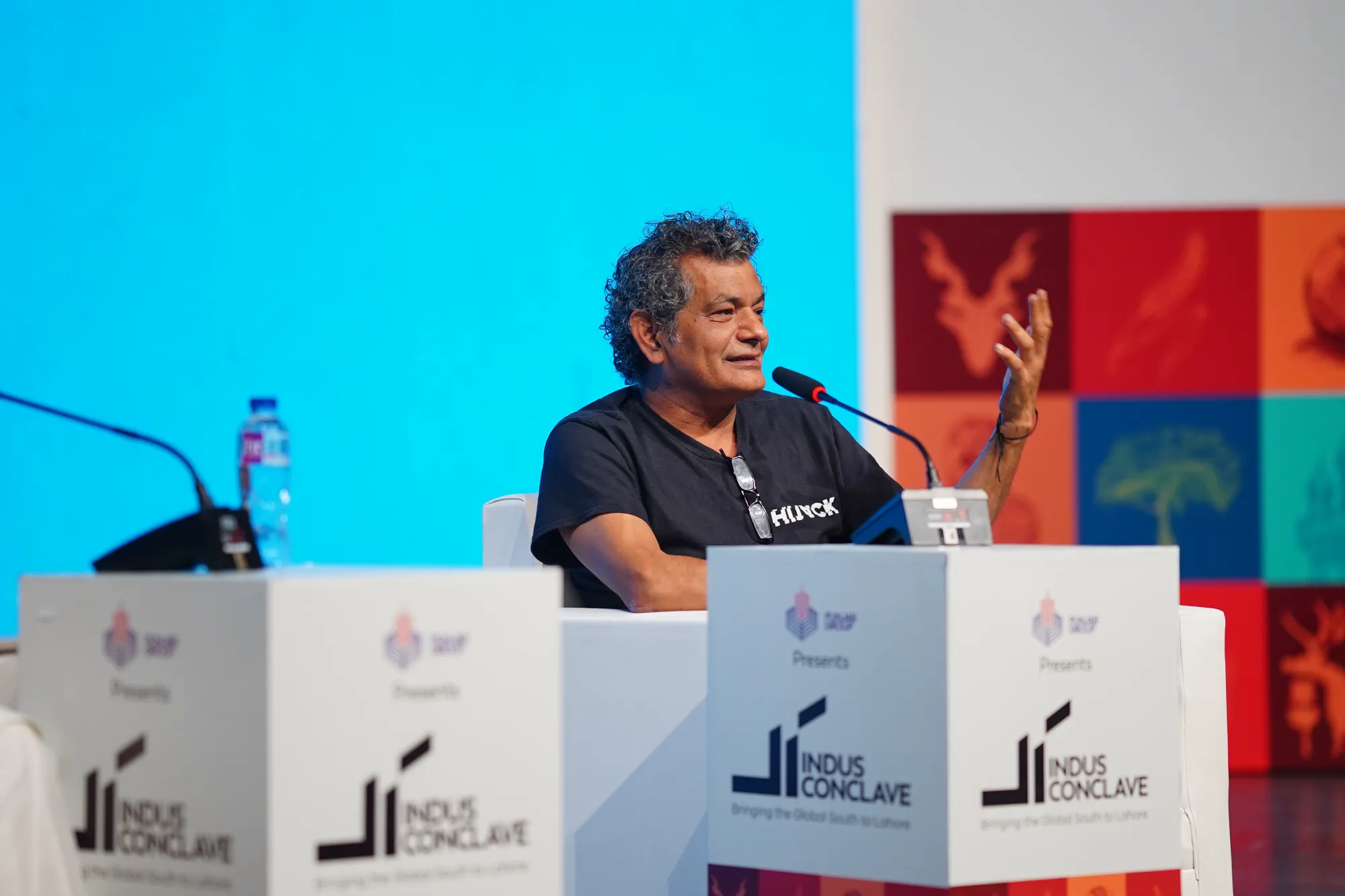
A panel that delved into the importance of inclusion—and the tools required to facilitate such an endeavour—was From Access to Equity: Building Pathways for Women in the Workforce with panellists Umme Laila, Dr. Farah Said, Kate Vyborny and Maheen Saleem Farooqi. The panellists spoke of the need for women to have access to transport and mobility, safety, feeling agency in their work without having to justify themselves to their families and even access to clean bathrooms. An interesting observation shared by Vyborny was that when women who had otherwise classified themselves as non-earning members of society were asked if they ‘helped in a business’ suddenly a new group of young women in rural areas were included in the category, as many held informal roles in places of work such as farms and small businesses.
Diversity, access and inclusion in urban spaces was further highlighted by Bisma Ahmad’s ‘Rah Cities’; they conducted two town halls during the Indus Conclave, inviting young public school students to a discussion on how to improve Lahore to make it more accessible and enjoyable for all. “We are trying to democratise city planning, since city planning at the moment is focused on large-scale, fancy, money-making ventures by our government that are not necessarily useful or addressing the needs of the common man. We want to facilitate the public’s involvement in city planning decisions, because while people are unhappy with the way the city is developing, they don’t have a platform to voice their concerns.”
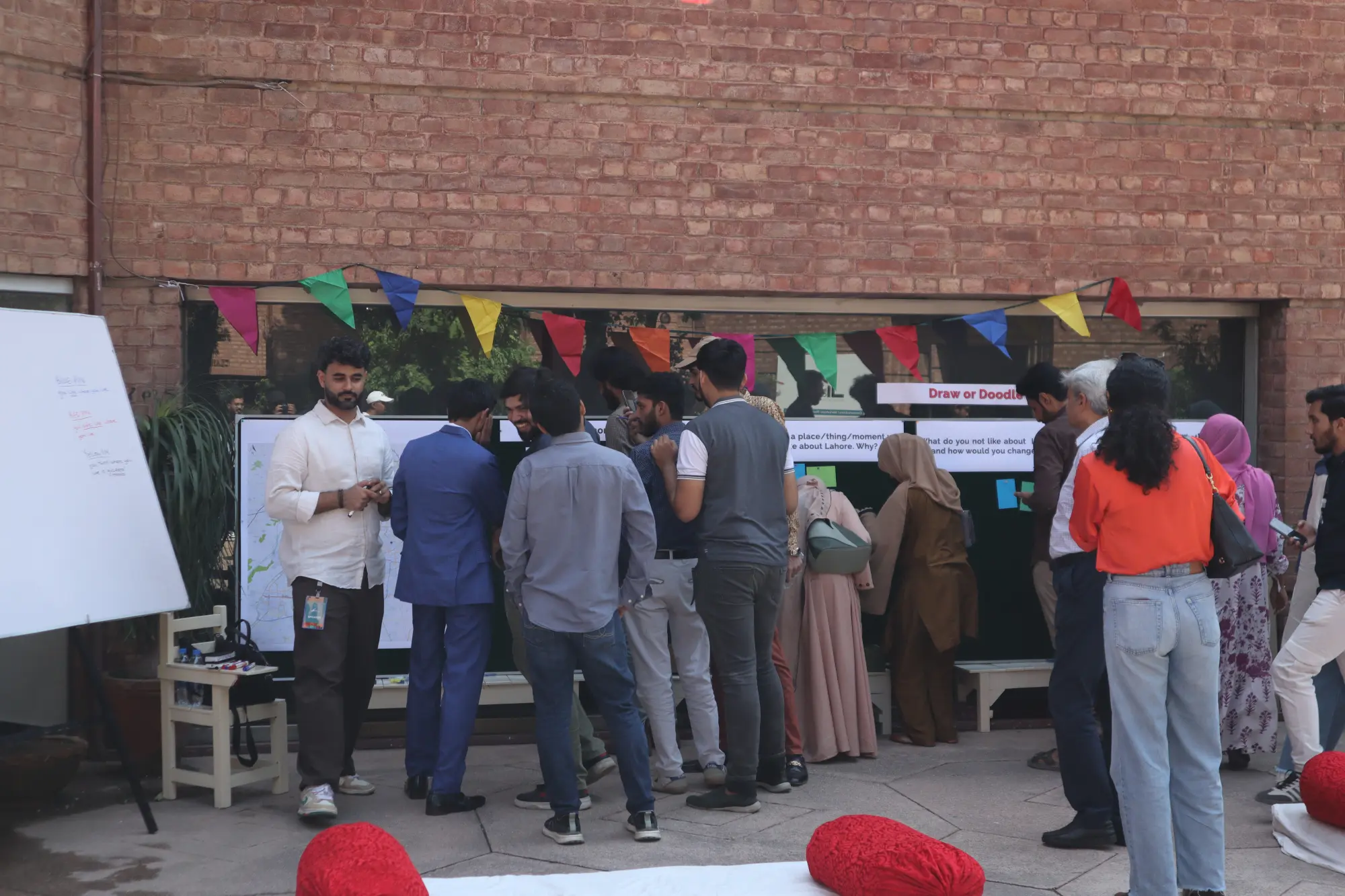
The atmosphere in and around Alhamra during the festival was electric; there was an energy in the gardens and courtyards that felt palpably inclusive, warm and safe. Live music was all around, whether from a group of youths huddled around a guitar, casually singing together as dusk fell, to passionate renditions of popular local songs by a band of talented musicians and singers from Punjab College during the lunch break on stage, and also from an open mic session where visitors to the festival displayed their musical stylings. Two of the best book stores in Lahore, Readings and The Last Word, had also set up book stalls in the green courtyard at the heart of the arts centre. Book lovers milled about, browsing classics and new offerings, while writers Dur e Aziz Amna and Arslan Athar sat down for book signings at The Last Word’s stall after their individual book launches. Nearby, the independent publishing house, The Peepul Press, had set up a kiosk with their exclusive publication of Knife of the Tide by poet Adrian A. Husain, in addition to their children’s literature publication Risala Magazine.
The atmosphere in and around Alhamra during the festival was electric; there was an energy in the gardens and courtyards that felt palpably inclusive, warm and safe.
Celebrating arts and culture is an important cornerstone for any regional conference; art can move audiences and draw attention to topics in ways that the written or spoken word may not be able to. The show A Gentle Apocalypse was “an exhibition exploring how artists engage with the present, how they respond to the conditions that shape their lives, and how art can hold space for both change and continuity” and showcased works from artists such as Amra Khan, David Alesworth, Marjan Baniasadi and Ayesha Jatoi. Viewing the works displayed in the foyer of Hall 1 as twilight fell, the atmosphere was poignant, especially as I approached Ayesha Jatoi’s ‘Witness’— a series of flags lamenting the loss of life of innocent children in Gaza. Nearby, an altarpiece made by Amra Khan, using wood entirely salvaged from pre-Partition homes, stood testament to the wisdom of indigenous plants and their medicinal properties. Her piece invited viewers “to act as custodians of memory” and “open(ed) a space for imagining another kind of future — one that listens backward in order to move forward: a gentle undoing, a gentle apocalypse”.
Interdisciplinary artist Nahla Tabbaa showcased an entirely different mood in her micro-residency entitled Street Foods, where artists came together to create an art installation composed entirely of food such as naans, jalebi, spices and paan. The goal of this residency was to celebrate the women who shape our shared spaces through taste, care, and creativity: ‘the queens of the everyday’, if you will. The outcome was a joyful and colorful celebration of our culinary heritage using every day, ordinary street food to showcase the power that these food items hold in our culture.
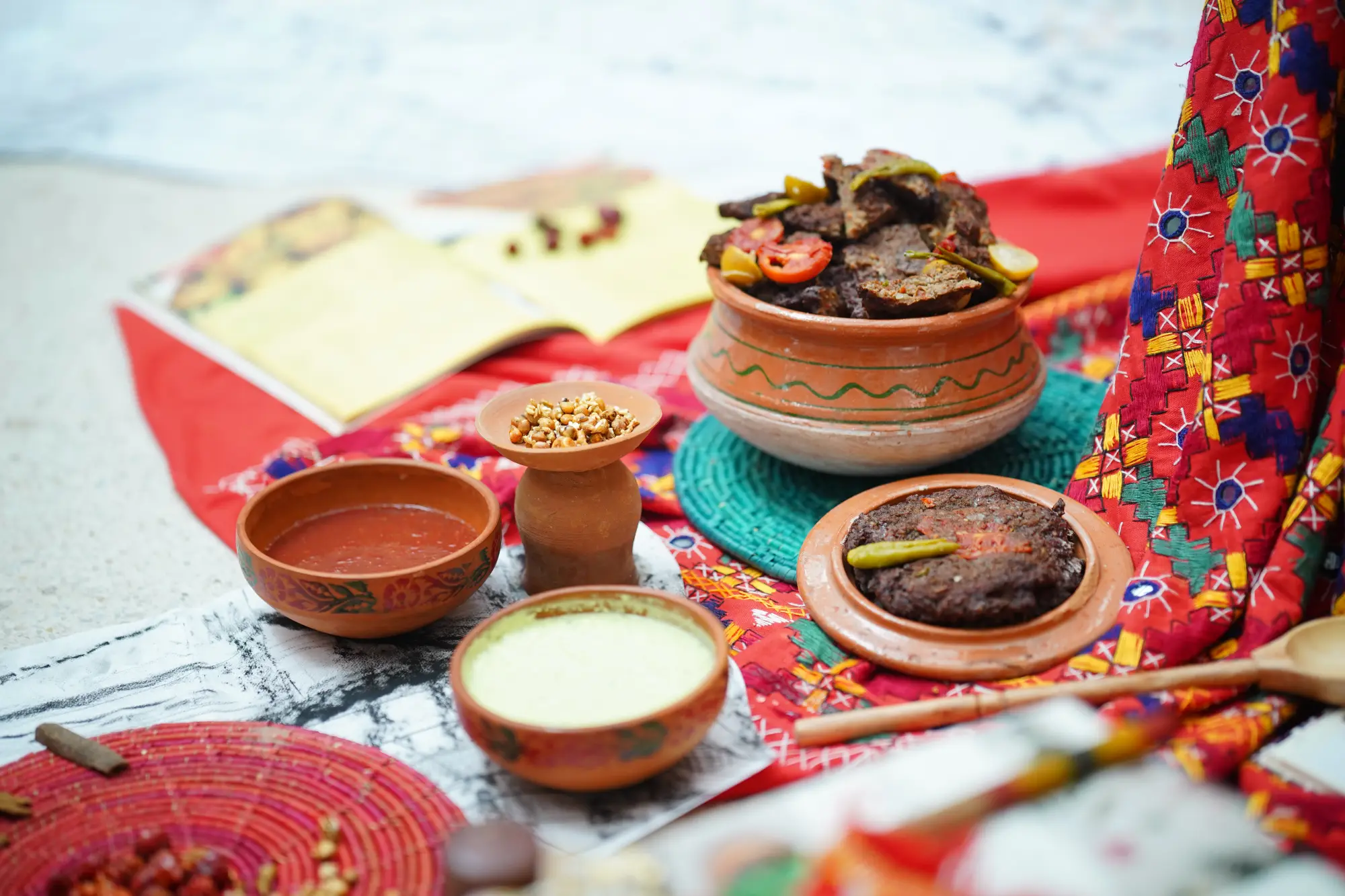
At the end of Sunday as the conference drew to a close, the mood at the Alhamra felt tender and soft. Chords from a guitar floated on the breeze, the weather benefitting from a storm the night before. Fairy lights twinkled in the trees as book signings took place in the garden at The Last Word book stall. People hung about murmuring pleasantly to one another, the frenetic energy of the conference tapering down as the festival came to its conclusion. There was a quiet sense of shared belonging to the city, of a renewed commitment to growing, learning and celebrating, the citizens of Lahore comforted with the knowledge that another opportunity for enriching our souls was seized and championed by the Punjab Group.
All photos courtesy of the Indus Conclave.

